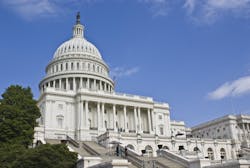The leaders of national healthcare associations and of hundreds of accountable care organizations (ACOs), medical groups, and health systems, have sent a letter to leaders in the U.S. Congress, imploring them to extend incentive payments around alternative payment models (APMs), in the face of the expiration of those incentives at the end of this calendar year.
The leaders of the Washington, D.C.-based NAACOS, the National Association of ACOs, on Wednesday, Sep. 28 posted a press release to their association’s website, which began thus: “More than 800 health care associations, accountable care organizations (ACOs), medical practices, and health systems urged leaders in Congress in a letter sent today to extend incentive payments meant to encourage participation in risk-bearing alternative payment models (APMs). Those incentives expire at the end of the year unless Congress acts.”
What’s more, the press release notes, “Congress in 2015 created a 5 percent incentive payment to help providers move to new payment models, which include ACOs. While there are nearly 300,000 clinicians expected to receive the incentive this year, that’s nowhere near where Congress expected it to be when it was created. Therefore, the letter calls on lawmakers to extend the incentives to allow more time for a greater number of providers to move into APMs, which have shown an ability to improve quality and lower overall cost of care.”
“Ending these important incentive payments would discourage future participation in models that have seen growing uptake in recent years,” the letter states. “The incentive payments not only encourage physicians and additional health care practitioners to enter models, but also provide additional resources that can be used to expand services beyond traditional fee-for-service.”
And the press release notes that “The 5 percent incentives and the benefits they bring our health system will be the subject of a briefing hosted Thursday on Capitol Hill. The event is being co-hosted by the National Association of ACOs (NAACOS).”
The press release goes on to note that “The letter was signed by 805 organizations, including just under 600 medical practices, more than 200 ACOs and health systems, and 17 provider associations and coalitions. Signing the letter were the Alliance for Technology Driven Health, American Academy of Family Physicians, American College of Physicians, American Medical Association, American Medical Group Association, America’s Essential Hospitals, America’s Physician Groups, Association of American Medical Colleges, Association of Community Cancer Centers, Health Care Transformation Task Force, Medical Group Management Association, National Association of ACOs, National Rural Health Association, Partnership to Empower Physician-Led Care, Premier, Inc., Primary Care Collaborative, and Value Based Care Coalition.”
And, it adds, “If the incentives expire, the letter’s signers fear important services offered to patients would be lost. For example, the money helps providers invest in digital health tools, care coordinators, data analytics, transitional care services, and innovative patient engagement methods. All these tools help to improve patient outcomes, care quality, and satisfaction. If the incentives go away, patient care would be diminished.”
Indeed, “ACOs, the predominant type of Advanced APM, have used these incentives to fund wellness programs, pay for patient transportation and meals programs, reduce cost sharing for beneficiaries, and hire care coordinators,” the letter states. “These are services that are not typically reimbursed through Medicare but improve patient health outcomes and wellbeing.”
The letter is addressed to House Speaker Nancy Pelosi, House Minority Leader Kevin McCarthy, Senate Majority Leader Chuck Schumer, and Senate Minority Leader Mitch McConnell. After addressing the four leaders, it begins thus: “On behalf of the over 800 undersigned physician and health care associations, health systems, provider practices, and accountable care organizations (ACOs), thank you for your leadership to ensure physicians and other clinicians have adequate resources to care for the health of the U.S. population. As Congress considers priority end-of-year legislation, we ask that you bolster and advance the ongoing transition to value-based health care by extending Medicare’s 5 percent Advanced Alternative Payment Model (APM) incentive payments authorized under the Medicare Access and CHIP Reauthorization Act (MACRA). As you know, a key aim of MACRA was to encourage physicians and other health care providers to transition into Advanced APMs. To help achieve this important goal, MACRA provided 5 percent incentive payments to facilitate participation in these models by physicians and other clinicians, including those in primary care, cancer care, kidney disease care, and more. A crucial benefit of Advanced APMs is that they are rooted in the principle of accountability where financial performance is linked to quality and outcomes, rather than volume,” it reads.
Further, the letter goes on to say, “Absent congressional intervention, the ability for clinicians to qualify for the incentive payments is set to expire at end of 2022. This development would reduce reimbursements and serve as a disincentive to nearly 300,000 clinicians working to improve the quality and cost-effectiveness of care for millions of Medicare beneficiaries. These physicians and other health care providers have made laudable efforts to transform and improve the health care system by participating in Advanced APMs. Ending these important incentive payments would discourage future participation in models that have seen growing uptake in recent years. The incentive payments not only encourage physicians and other health care providers to enter models, but also provide additional resources that can be used to expand services beyond traditional fee-for-service. For example, ACOs, the predominant type of Advanced APM, have used these incentives to fund wellness programs, pay for patient transportation and meals programs, reduce cost sharing for beneficiaries, and hire care coordinators. These are services that are not typically reimbursed through Medicare but improve patient health outcomes and wellbeing.”
What’s more, the letter states, “Successful transition to Advanced APMs means that physicians and other health care providers must invest in workflow improvements, digital health tools, care coordinators, data analytics, quality measurement systems, transitional care services, and innovative patient engagement methods. On average ACOs spend between $1 to $2 million per year on these types of advanced care delivery tools. The Advanced APM incentive payments undoubtedly help them afford some of these investments, allowing them to reinvest in care transformation initiatives to benefit patients. Advanced APMs are transforming how patients in traditional Medicare receive care. It’s also clear these payment system reforms have been a good financial investment for the government, generating cost savings for the Medicare Trust Funds and improving patient outcomes. In the last decade, ACOs have generated more than $16 billion in gross savings and produced higher quality care for patients. Evidence also shows ACOs participating as Advanced APMs have generated higher net per beneficiary savings compared to those in non-advanced tracks. In 2020 alone, ACOs generated $4.8 billion in gross savings and $2.1 billion in net savings for CMS, which is a strong return on the investment of roughly $613 million CMS paid clinicians in Advanced APM incentive payments. Moreover, the growth of APMs has produced a ‘spill-over’ effect on care delivery across the nation, slowing the overall rate of growth of health care spending.”
The press release notes that, “Since 2012, ACOs have saved Medicare nearly $17 billion in gross savings and $6.3 billion in net savings. Importantly, data show these ACOs continued to provide high-quality care and yield satisfied patients. Today, ACOs care for nearly 20 percent of all Medicare patients and nearly a third of traditional Medicare patients. Importantly in Medicare, ACOs allow patients to maintain their choice of provider, and there are no network restrictions or use of prior authorization.”


